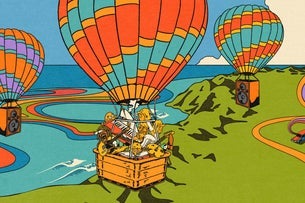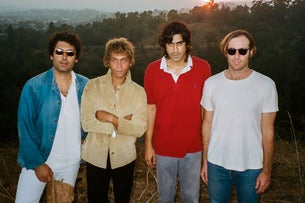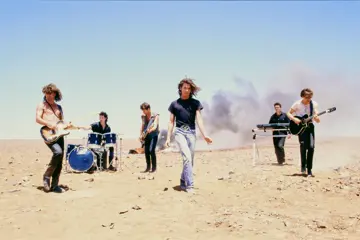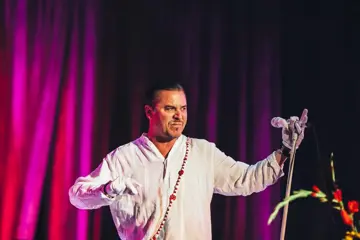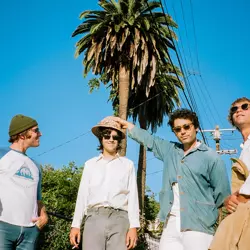 Allah-Las
Allah-LasYou can tell by their press shots and Insta page that Allah-Las are effortlessly cool cats. Add the fact that this band was founded while three of its four members worked at Amoeba Music in Los Angeles and Cameron Crowe could direct a movie based on their lives.
The band's aesthetic is undeniably swoonworthy, but it's this quartet's collective music fandom that truly elevates Allah-Las' songcraft. On the band's fourth LP Lahs, which references a common misspelling of their band name (Allah-Lahs, with a rogue 'h'), intersecting melodies shimmer as listeners become increasingly aware of the breadth of Allah-Las' musical knowledge. Something about opener Holding Pattern calls to mind Eric Burdon & War's classic, Spill The Wine. "I've certainly heard that [song], but it never occurred to me," vocalist/guitarist Miles Michaud ponders. "I'm sure I won't be able to not think of it now," he chuckles good-naturedly. And Keeping Dry's vocal melody evokes Eric Clapton's Cocaine to this pair of ears... "Oh, yeah, I hear that!" he allows. "I didn't think of that before; that makes sense."
Harmonies throughout Lahs evoke Simon & Garfunkel, which we sincerely hope Michaud takes as a compliment. He laughs, "That's great! I'm glad you appreciate that." Kind of like falling down a 'recommended for you' YouTube rabbit hole, listening to Lahs makes us wanna revisit long-forgotten gems. So what's one of Michaud's early memories of hearing a song that stopped him in his tracks?
"I remember when I was young and in middle school, the local punk scene was a big deal. I went to the same high school as Black Flag and the Descendents, and all those guys were from the South Bay where I grew up and so that scene was really big," Michaud explains. "I remember going to the record shop where I'd buy all that stuff and the guy who ran it, his name was Uncle Tim, and he turned me and my friends onto The Stooges' self-titled record, and that kinda blew our minds. I couldn't believe that it was music from the '60s and that really opened up this idea that there was pretty rough-and-tough music being made a long time before my contemporaries were interested in it. That kinda got me looking back into the past and digging into music that had come a long time before, and trying to figure out what the lineage of all that stuff was."
Don't miss a beat with our FREE daily newsletter
When asked how he would typically consume music around this time, Michaud offers, "It was all about Discman and, especially being from LA, it was all about listening to music in your car. So you'd get a ride with somebody and they'd have a few CDs and they'd put on something you hadn't heard before, and it was just a great way to listen to new music at that time. There's a sense of freedom associated with being 16, 17, and driving around and listening to something new."
Lahs could soundtrack summertime poolside soirées, complete with signature cocktails and canapés. How does Michaud hope this record exists in the lives of listeners? "It would be nice to think that music like ours could have a wide enough appeal that people from different walks of life and with different interests in different styles of music, and different backgrounds, could come together with this mutual interest. And I think that's really something that art should always strive for is uniting people across different walks of life."
Michaud estimates it took "two and half years, easy" from when Allah-Las composed the first track that made it onto Lahs, Light Yearly ("That's one we've been playing live for a coupla years now"), to the album's completion. Of the record's lengthy gestation period, Michaud reveals, "We built our own studio and spent a lot of time in there just going through ideas and taking our time with them, and we didn't wanna feel rushed into, you know, having a deadline and finishing the record by a certain time. We wanted to make sure that we had it to the point that we were happy with it. We did a lotta the recording ourselves and I think in the end a lotta that kind of casualness comes through in the overall tone and feeling of the record. We're all really happy with the way it turned out."

